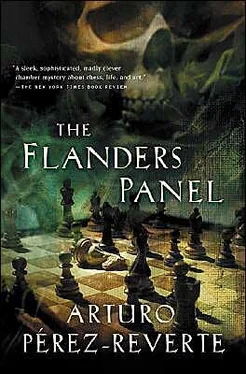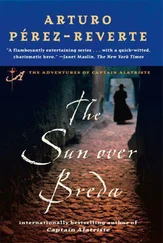“There’s an explanation for everything,” replied Cesar. “But I didn’t mean to interrupt you, my dear. Go on.”
“There’s nor much more to say. At least not here, tonight. Alvaro Ortega was killed by someone he perhaps knew, but I wasn’t completely sure about that. However, Menchu Roch would never have opened the door to a stranger, especially in the circumstances described by Max. In the cafe the other night, you said there were almost no suspects left, and you were right. I tried to approach it analytically, in successive stages. Lola Belmonte wasn’t my opponent; I knew that as soon as I met her. Nor was her husband. As for Don Manuel Belmonte, his odd musical paradoxes gave me plenty of food for thought… But the suspect was someone unbalanced. His chess-playing side, if I may put it like that, was not up to it. Besides, he was an invalid, which ruled out the violent actions perpetrated against Alvaro and Menchu. A possible combination of uncle and niece, bearing in mind the blonde woman in the raincoat, didn’t stand up to detailed analysis either: why would they steal something that was theirs already? As for Montegrifo, I made some enquiries, and I know that he has no links with chess whatsoever. Besides, Menchu would never have opened the door to him either that morning.”
“So that left only me.”
“As you know, when one has eliminated the impossible, whatever remains, however improbable, must be the truth.”
“Of course I remember, my dear. And I congratulate you. I’m glad to see that I did not misjudge you.”
“That’s why you chose me, isn’t it? You knew that I would win the game. You wanted to be beaten.”
With an obliging little smile, Cesar indicated that it was now a matter of no importance.
“I did indeed expect to be beaten. I called on your good offices because Julia needed a guide in her descent into hell… Because this time I had to concentrate on playing the role of the Devil. She needed a companion. So I gave her one.”
Julia’s eyes flashed when she heard that. Her voice sounded metallic.
“You weren’t playing at being the Devil, but at being God. Dealing out good and evil, life and death.”
“It was your game, Julia.”
“You’re lying. It was yours. I was just a pretext.”
Cesar gave her a reproving look.
“You haven’t understood anything, my dear. But that doesn’t matter any more. Look in any mirror; perhaps you’ll agree with me then.”
“You can keep your mirrors, Cesar.”
He was genuinely hurt, like a dog or a child unjustly treated. The dumb reproach, overflowing with absurd loyalty, gradually faded from his eyes, and all that remained was an absorbed, almost tearful gaze, staring into space. Slowly he moved his head and looked again at Munoz.
“You haven’t yet told me,” he said, and he seemed to have difficulty recovering the tone he had used before when talking to Munoz, “how you set the trap that finally made your inductive theories fit the facts. Why have you come to see me with Julia tonight, and not yesterday, for example?”
“Because yesterday you hadn’t declined for the second time to take the white queen. Also because until this afternoon I hadn’t found what I was looking for: a bound volume of chess magazines for the fourth quarter of 1945. There’s a photograph of the finalists in a junior chess tournament in it, and you’re there, Cesar, your name and surname are on the following page. What surprises me is that you weren’t a winner. It also puzzles me that after that there’s no mention of you as a chess player. You never played in public again.”
“There’s something I don’t understand,” said Julia. “Or, to be exact, there’s something else, apart from all the many things I don’t understand in all this madness. I’ve known you for as long as I can remember, Cesar. I grew up with you, and I thought I knew every corner of your life. But you never once mentioned chess. Never. Why?”
“That’s a long story.”
“We’ve got time,” said Munoz.
It was the last game in the tournament, with only a few pieces left on the board. Opposite the platform on which the finalists were playing, a few spectators were following the moves as a judge wrote on a panel on the wall, between a portrait of General Franco and a calendar -the date was 12 October 1945 – above the table on which stood the gleaming silver cup intended for the winner.
The young boy in the grey jacket fiddled nervously with the knot of his tie and looked despairingly at the black pieces on the board. The last few moves of his opponent’s methodical, implacable game had manoeuvred him relentlessly into a corner. It wasn’t that White had a brilliant game plan, it was simply a question of slow progress starting with a solid initial defence – the King’s Indian defence – and getting the upper hand purely and simply by waiting patiently and exploiting his opponent’s mistakes. An unimaginative game that risked nothing had, for precisely that reason, sabotaged every attempt at an attack on his king by Black, whose forces were now scattered, incapable of helping each other, or even of providing obstacles to the advance of the two white pawns, which, taking turns to move, were about to be promoted.
The eyes of the boy in the grey jacket were dull with weariness and shame. The knowledge that his game was superior, more daring and brilliant than that of his opponent, could not console him for his inevitable defeat. His fifteen-year-old’s imagination, extravagant and fiery, the extreme sensitivity of his spirit and the lucidity of his thought, even the almost physical pleasure he felt when he moved the varnished wooden chessmen elegantly across the board, creating on the black and white squares a delicate network that he considered to be of almost perfect beauty and harmony, all seemed sterile now, sullied by the crude satisfaction and disdain evident on his opponent’s face: a sallow-skinned lout with small eyes and coarse features whose only strategy had been to wait prudently, like a spider in the centre of his web, a strategy of unspeakable cowardice.
So this too was chess, thought the boy playing Black. In the final analysis, it was the humiliation of undeserved defeat, with the prize going to those who risk nothing. That was what he felt at that moment, seated for a game that was not merely a foolish set of moves, but a mirror of life itself, of flesh and blood, life and death, heroism and sacrifice. Like the proud knights of France at Crecy, undone in the midst of empty victory by the Welsh archers of the King of England, he had seen the attacks made by his knights and bishops, moves that were daring and deep, like the splendid, glittering blows of a sword, one crash after the other, like heroic but futile waves, against the phlegmatic immobility of his opponent. And that hated piece, the white king, on the other side of his insurmountable barrier of plebeian pawns, observed from a safe distance, with as much scorn as that reflected on the face of the White player, the discomfort and impotence of the solitary black king, incapable of helping his remaining faithful pawns, who were engaged in a hopeless battle, an agonising free-for-all.
On that pitiless battleground of cold black and white squares there was no room for honour in defeat. Defeat wiped out everything, destroying not only the loser but also his imagination, his dreams, his self-esteem. The boy in the grey jacket leaned his elbow on the table, cradled his forehead in the palm of his hand and closed his eyes, listening as the sound of clashing weapons died slowly away in the valley flooded with shadows. Never again, he said to himself. Just as the Gauls conquered by Rome refused ever to speak of their defeat, he too, for the rest of his life, would refuse to remember his, and sterility of victory. He would never again play chess. And, with luck, he would be able to wipe it from his memory, just as the names of dead Pharaohs were removed from all the monuments.
Читать дальше












